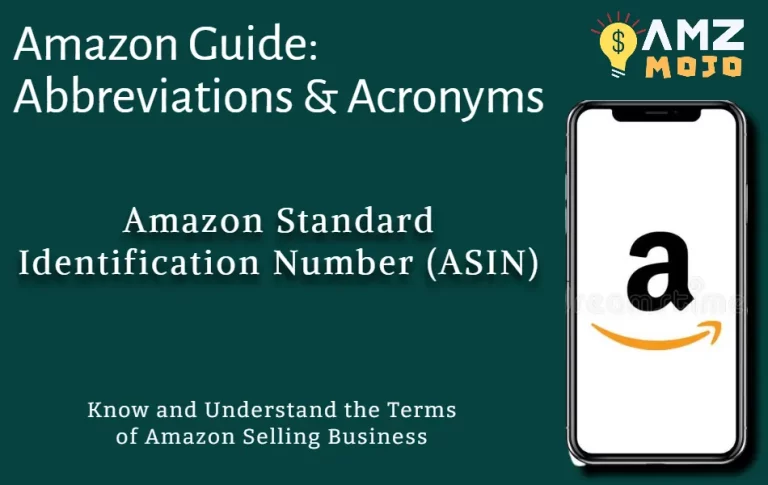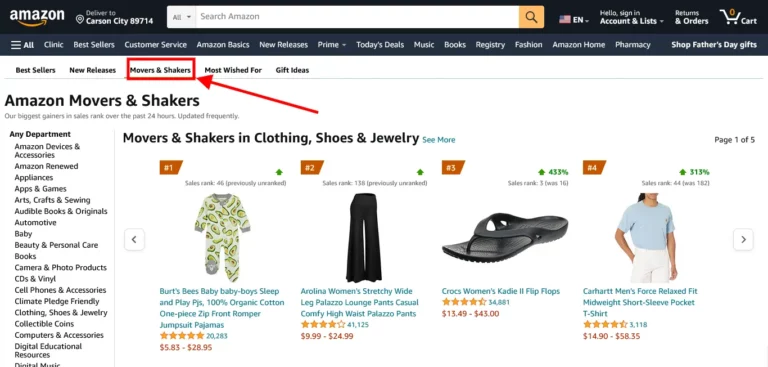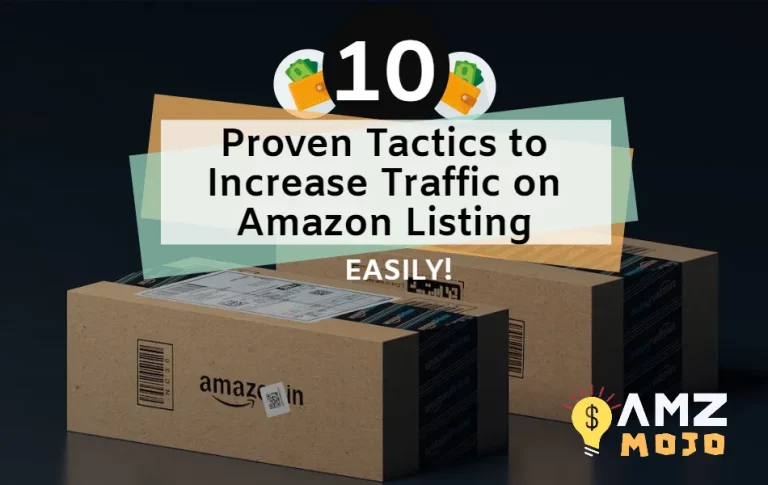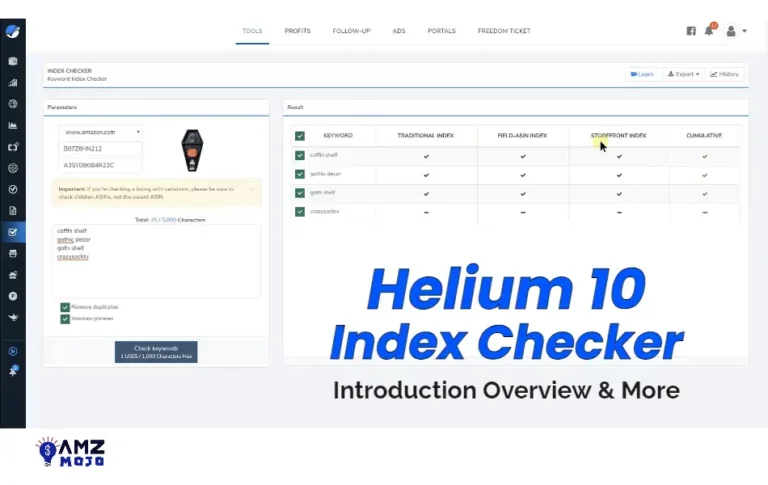Believe it or not, Amazon is also a search engine we have forever been misinterpreting only as a marketplace. And here sellers always opt for the keywords that rank higher but on the other hand they should also look for the ones that have a low competition, but how to find low competition Amazon keywords? Continue reading to know
We aren't saying this statement blatantly, but think of it this way – whenever you search any product on Amazon (as a seller or as a buyer), isn't the process same as searching anything on any search engine (be it Google or Microsoft edge). Yes, undoubtedly it is!
Now, next thing, while searching any product on Amazon, do you get to see the same thing? For most of the time, Amazon does recommend the product you have searched for, but a few times it doesn't. And when does this happen? Most precisely when you picked up the wrong keyword to search for a product.
You see, the whole process is the same as the search engines available out there; and just the way keywords play an important role on different search engines, it does so on Amazon as well.
Initially when Amazon was launched, visitors used to spend hours looking out for THE PRODUCT. But now, since the algorithm kept on learning what descriptive terms customers are looking for and what products they are choosing under that term – Amazon improved much.
Hence, as an Amazon FBA seller, the first important thing you need to do is look out for that winning product – undoubtedly, but the next important thing is Keyword research itself.
In fact, do remember that, on Amazon – the secret sauce of selling the right product to the right customer is the choice of right keywords.
Because whenever you will list out any product to sell on Amazon, the algorithm will first look for the keywords to understand what exactly you are selling, and then only it will list the product out to the customer who is searching for it.
The algorithm will place your product according to the keyword you have used on its search results page – which in specific is known as ranking!
Is it a Big Thing to Rank on Amazon?
If you are into Amazon FBA for quite a while now, you would know how difficult it is to rank your products higher, but if you are still new to this, let's take it this way:
You are searching for any specific product on Amazon, for example: Yoga Pants. As a buyer, you will naturally hit the first three options, and look out for reviews. If the reviews are positive, and the pants are in your budget, you will go no further and hit the buy now button. But, unfortunately, you didn't liked the quality of the pants sold by sellers on the first page, so you will think of moving to second, and there will be tens of sellers selling more good pants. Chances are, on the second listing itself you will get your yoga pant.
That's how ranking works, buyers don't have much time to check out hundreds of products listed on Amazon. Instead, a majority of them focus on the first and second listing only.
Which means, if you, as a seller got access to the best keyword – that's more in demand, and your product (fortunately) got listed on the top – you can expect thousands of dollars from just a product. Sounds amazing, right?
But since so many players are already into the market – Is it just so easy to find low competition amazon keyword, or high ranking amazon keyword? Fortunately, It is!
Tips to Find Low Competition Amazon Keywords in 2024
Type any keyword in the Amazon search bar, and look out for suggestions
One of the best and free techniques to perform keyword research is through Amazon itself. Just go to the search button and enter any keyword, the marketplace will quickly suggest you related keywords other visitors are frequently searching for.
Taking the above example here too, if you'll search Yoga Pants on Amazon, the related keywords Amazon lists out quickly are: Women's Yoga Pants, Women's Yoga Leggings, Women's Yoga Clothing, yoga pants for women stretchable, and so much more.
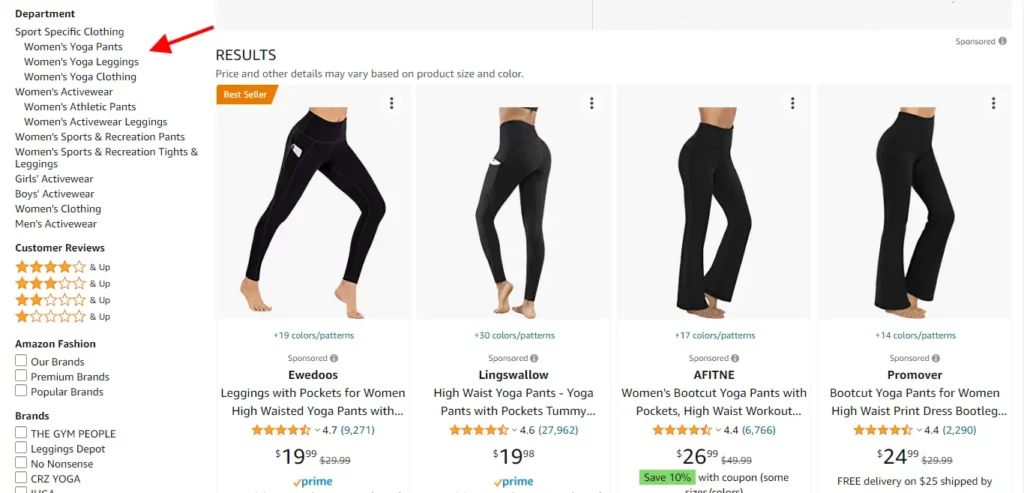
If searched properly, Amazon itself appears to be a free Amazon keyword research tool that can give you a quick snapshot into what customers are specifically looking out for. If you will see the above keywords, you will notice most of them are long-tail keywords for which the best and relatable products are ranking for.
Not completely, but you can rely on Amazon for keyword research in your initial Amazon FBA days. Just spend some more time entering different set of keywords, and at the end of the day, you will have a strong list of high competition keywords for your listing.
Search Complementary Products
If you would know e-commerce better, you will also know that customers often end up buying multiple products, even if they are simply looking out for one. Specifically on Amazon, the marketplace lists out, “Frequently bought together” section to customers. This section covers multiple products that complement a specific product.
Over here, we will be taking the example of Yoga Mats. When we specifically searched for Yoga Mats – the marketplace listed out a section, frequently bought together – and the product it suggested here to buy is a skipping rope.
But why are we talking about this?
Whenever you search for products that complement your product, the chances of your product getting visible to the right customer increases much. For example, if you are thinking of selling skipping rope, then you can use the Yoga Mat keyword in your bullet points, product description, or in the backend. In this way, your product will be visible to those who aren't searching for skipping rope, but somehow they might get interested because of their buying patterns.
In a lot of cases, you can quickly explore complements, for example if you are selling a mobile phone, products that will complement it would be a phone case, or a scratch guard. And in the same way, if you are thinking of selling bats, the complement here would be a ball, or gloves.
But, in a few cases you will have to do your research, just like yoga mat and skipping rope (because it was unbelievable).
Do a Quick Competitor Analysis
Now that you have used Amazon at its best, there's one more strategic thing you can do on this marketplace, and that's competitor analysis. You can actually look out for products your competitors are selling, and then watch out their titles, product description, and bullet points. Check out how they are inserting keywords in their listing, and what are the most common ones (probably the one they are ranking for).
You can even visit their store to check out how many products they are selling, and out of so many, which specific ones are the bestsellers – and why are they ranking?
Learn the Industry on Different Search Engines
Everything above was all about researching on Amazon, but if you want to rank higher on the marketplace, you will definitely need help from search engines as well. Many individuals undoubtedly search products directly on Amazon, but a few shoppers (Read: Many) first look out for products on Google, and then move to Amazon to buy.
So, if you want your products to be visible to a huge audience, you must incorporate Google into your Amazon keyword strategy game. For this you can either use Google search console, or SEMrush to explore high volume keywords. Later, you can target these keywords across your listings and seller account, for your product to be visible to audiences on different search engines as well.
Take help of Third Party Keyword Research Tools
All the above steps were undoubtedly fruitful, but let's get back to reality, nobody has so much time to perform such a back-breaking task. In fact, when it comes to selling any product on Amazon; sellers here are running their research on god speed. So, to not miss out on the competition, it's never too late to take help from third party keyword research tools.
And if you are on a search for low competition, high volume keywords – you must definitely take help of Keyword Research Tools.
Tools you can Use to Find Low Competition Amazon Keywords – Free and Paid
Helium 10
Helium 10 is a powerful Amazon all in one seller solution offering users access to multiple tools for free to ace their selling game. Users can use Helium 10's Magnet and Cerebro tools in unison to perform keyword research.
To help users do free low competition keyword research, Helium 10 has a dedicated landing page for this. Sellers just have to sign up, and enter a keyword/ASIN, along with the geolocation, and the free tool will give you a list of competitive keywords that would help a seller rank better.
Ahrefs
Ahrefs is one of the popular free Amazon keyword research tools through which any seller can get access to thousands of keyword ideas within seconds. They just have to move to their official free keyword generator page, click on Amazon, and enter a keyword. Over here too sellers can enter the geolocation, and then hit the find keywords button.
Within a few seconds the tool will list out thousands of relevant keywords along with the search volume for sellers to take quick inspirations.
Jungle Scout
Jungle Scout is yet another popular keyword research tool, but it's not available for free, instead users will have to pay at least $29 per month (base plan) or $49 per month (suite plan) to get started with keyword research. But paying these many dollars is worth it, since Jungle Scout is trusted by thousands of Amazon FBA sellers.
Now, the tool Jungle Scout offers for keyword research is Keyword Scout. Through keyword scout, sellers can explore high-ranking keywords that are extracted from millions of data points. Sellers can even explore historical search volume of each keyword, and with filters available, sellers can also grab access to low competition, high demand keywords within seconds.
Google Keyword Planner
Google keyword is yet another free Amazon keyword research tool through which sellers can explore low competition keywords within seconds. But to use Google keyword planner, sellers will have to create a free AdWords account. There's no need to start any active campaigns here, once you have created the account, you can move to the Keyword planner option available under the tools tab.
Now, you can enter main keywords in the search bar, and by the help of filters available, you can perform more precise research. With every keyword, Google planner will even list out average monthly searches through which you can assume the search volume. Lastly, you can even download this list of keywords in a CSV file for future reference.
Sellics
Similar to Jungle Scout, Sellics also offers Amazon keyword research tool to users – Sonar, but here it's available for free. The best part of using Sonar for Amazon keyword research is it's 100% free, no signup is required. Sellers will just have to enter a keyword or ASIN, make changes in the geolocation, and hit the ping button.
Apart from this, Sellics even offer users access to extended keyword lists (synonyms keywords), reverse lookups, and cross market search. Through these options sellers can easily search low competition, high demand keywords within a quick time period.
Top FAQs on How to Find Low Competition Amazon Keywords
How can I perform low competition keyword research on Amazon?
To perform low competition keyword research on Amazon, you can take help of third party tools, like Jungle Scout, Helium 10, Viral Launch, Feedback Five, Keepa, AMZScout, Sellics, and Zonbase.
Can I perform low competition Amazon keyword research for free?
Yes, you can perform low competition Amazon keyword research for free with Ahrefs, Google Keyword planner, Helium 10, Jungle Scout, and Sellics.
Conclusion: Find Low Competition Amazon Keywords and Other Important Factors
Now that you have explored a great list of low competition Amazon keywords, next comes the listing optimization part. From titles, bullet points, product description, to back-end keywords, you can use low competition keywords anywhere. But, over here, you have to make sure that you don't stuff keywords, instead focus more on making the content compelling to visitors.
If your title or description is not compelling enough, it can negatively impact your click through and conversion rates. Your customer will not even watch out your products, since the same words will either confuse or irritate them.
For example, if a low competition keyword is not making sense in the front end, like title and product description, you can include them in the back-end search terms. In short, finding the sweet spot between keyword insertion and creating compelling titles is what you need to do.
And do remember that even if low competition keywords have a great conversion rate, there are other factors that also influence Amazon SEO, like – positive customer reviews, historical sales, and right pricing. Hence, stay tuned to AMZmojo to explore more such Amazon SEO tweaks for your next converting Amazon listing!


